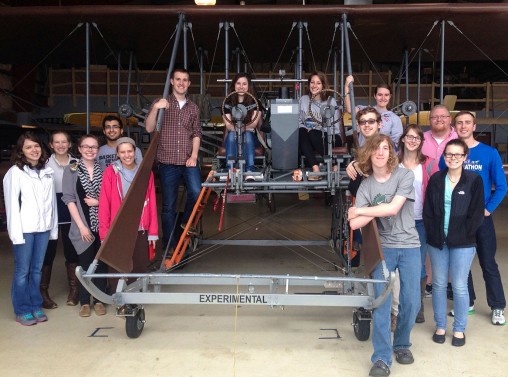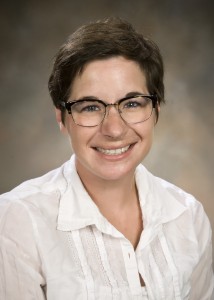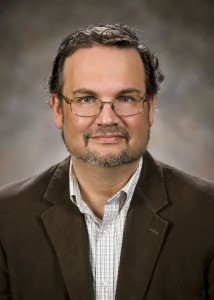
Students in the Dayton’s Aviation History course are introduced to the Dayton area’s rich aviation heritage. Pictured is the spring 2015 class.
Dayton’s Aviation History. Cuisine in French Cinema. Writing Stand-Up Comedy.
It’s not all calculus and organic chemistry. Courses offered at Wright State University give students a chance to indulge in a mind-expanding, creative exploration across various fields of study.
Students have dozens of unusual and interesting courses from which to choose. Listed below are a sampling of such courses that have been offered through various colleges at Wright State.
Aviation
“If birds can glide for long periods of time, then … why can’t I,” said Orville Wright, who, along with his brother, Wilbur, invented the airplane in their Dayton bicycle shop and conducted most of their early test flights on nearby Huffman Prairie.
Wright State students participate in Ohio’s rich aviation history, not just by studying aviation history but also by learning how to fly a plane. Whether you are curious or experienced with planes, Wright State’s aviation courses will heighten your knowledge and increase your interest.
Dayton’s Aviation History (Course: UH 4000)
This exclusive Wright State course introduces students to the aviation heritage of Dayton and the Miami Valley, from the Wright brothers to Wright-Patterson Air Force Base to the space age.
“Our field trips were to all of the famous aviation sights along the Aviation Trail,” said Carissa Wolfe, a biology major who took the course. “My two favorite places were the Wright Factory in downtown Dayton and the Dayton-Wright Brothers Airport in Miamisburg.”
Students must be in the Honors Program to register for this course. Learn more about this course >>
Other aviation courses:
- Introduction to Aviation and Aviation Systems
Private Pilot Ground School
English
From Jane Austen to Edgar Allen Poe to Jules Verne, English has a rich history of diverse ideas and genres that complement the vast array of English courses a Wright State student can take.
Chillers and Thrillers (Course: ENG 2040)
Thrill, romance, death and human nature are terms that describe the chilling works students study in this course. Students learn the social and historical perspectives on common and lesser-known texts — such as “Frankenstein” and “Dracula” — that combine Gothic literature and dark romanticism through literature and media.
“A favorite discussion of mine is when my students and I explore the thematic upwellings of the texts in Michael Jackson’s video ‘Thriller,’” said David Wilson, Ph.D., professor of English. “I get the sense that a lot of them are not only learning about history and a certain type of literature but having fun doing it, too. That’s important to me.”
This course is usually offered at Wright State’s Lake Campus but will be offered online in spring of 2016.
Learn more about this course (PDF) >>
Another course of interest:
- Science Fiction Story and Film
Romanticism and the Body (Course: ENG 4200)
Romanticism, a style of art and literature popular in the late 18th and early 19th centuries, is famous for celebrating the thrilling power of an unbounded imagination. This course emphasizes how important the body was for Romantic writers.
Crystal B. Lake, Ph.D., assistant professor in the Department of English Language and Literatures, was inspired to develop the course while conducting research in the Pforzheimer Collection in the New York Public Library. Lake examined rare materials from the 1800s that captured Romantic writers’ beliefs about death, including artifacts such as fragments of skulls and locks of hair.
“This research is really crucial to understanding not only famous novels … but also important political and philosophical debates that occurred around the time of the French Revolution,” Lake said. “As a result, the Romantic science of the body proved pivotal for those writers thinking about what kinds of relationships governments and society ought to have to individuals and vice versa.”
The debates resonate with the technology of expanding life, the ethics of medical research and the role of the government in health care. The course studies the views of authors, poets and scientists on scientific experiments on the body and how they incorporated their views into their philosophical and literary works, like “Frankenstein,” in order to consider their larger implications.
This course will be offered in the fall semester.
Engineering and Computer Science
For the math lovers, engineering may be a great fit due to its popularity, high pay and the “cool things” one may build.
Scientific Visualization and Virtual Environment (Course: CEG 4500)
This course introduces various visualization methods and algorithms to help students visualize different types of data sets, including medical, flow simulations and generic information.
An example of visualizing data is using Google Maps and Google Earth. The course provides techniques for generating visualizations of data types including scalar, vector and tensor data. The course complements the Computer Graphics course.
Learn more about this course >>
Other courses of interest:
- Gamification
- Mobile Application Development
Anthropology and History
Whether you are good at remembering dates of historical events or the people behind them, Wright State’s departments of History and Sociology and Anthropology are full of interesting courses for all types of learners and interests.
Field School in Archaeology (Course: ATH 4650/6650)
This unusual course is opened to students of all majors and provides a hands-on archaeological survey and excavation experience. Students investigates Fort Ancient Earthwork, a National Historic Landmark site built in in northern Warren County in 100 B.C. to A.D. 400.
The Wright State archaeology program has uncovered evidence and new discoveries of the Hopewell people who lived at Fort Ancient.
Learn more about this course >>
Living History (Course: HST 4850)
“‘Living History’ — a notion that embraces ‘historical reenacting’ and ‘experiential history,’ is one of the avenues by which most Americans come into contact with the past,” said Paul Lockhart, Ph.D, professor of history and the Brage Golding Distinguished Professor of Research.
History reenactments can be found at historical sites, museums and parks. In this course, students watch living history as a way of bringing history to a broader public, to understand the potential uses and drawbacks of living history, how the living history community has emerged and developed over the past half century and what goes into the practice of living history.
Wright State is the only college and university in the U.S. to offer a course on living history and reenacting, Lockhart said.
Learn more about this course >>
A Global Food History (Course: HST 4870)
What should we eat, and where will we get it? Food security, shortages, miraculous crop yields, genetically modified products and the plight of food producers make daily news. This course explores the history of global food production and consumption with an emphasis on the United States, using food as a window into cultural change, social inequality, environmental issues and labor.
- Other classes on health, dieting and a deeper way of approaching food:
Biology of Food - Cereal Technology (Yes, the cereal in the bowl. Offered by the Wright State Lake Campus Farming Management program.)
- Introduction to Food Science (Offered by the Wright State Lake Campus Farming Management program)
- Philosophy of Food
Modern Languages
Hola. ¿Entiende usted? No matter what language you speak or would like to speak, Wright State’s Department of Modern Languages offers the program. Wright State offers classes for American Sign Language, Arabic, Chinese, French, German, Greek, Italian, Japanese, Portuguese, Russian and Spanish. Some languages have been brought back due to popular demand.
Cuisine in French Cinema (Course: FR 4940)
Students learning how to cook French recipes while immersing themselves in the French language and culture.
This course is taught by a gourmet chef who allows the class to share in French recipes and tips. Students analyze four French films on the cultural, social and historical importance of the role that food plays in French culture. The course discusses the attitudes the French have toward nutrition and how it determines their cultural values. Students may meet a French chef and have a French-inspired lunch along with receiving a guided tour spoken in French.
Learn more about this course >>
Other unusual language courses:
- Doing Business in Latin America
- German Romanticism
- Intro to Arabic Culture
- Spanish courses emphasizing terms needed in law enforcement and the medical professions are also available
Psychology
When you reading, the occipital cortex and frontal lobe of the brain are active as the brain processes the visual information and interprets the meaning of these words. Psychology digs into the roots of the brain attempting to understand behavior, language, health, genetics and other aspects that humans — or animals — may possess.
Animal Intelligence (Course: PSY 2620)
This course studies the adaptive function of animal behavior based on evolution. It discusses associative learning, discrimination learning, category formation, short- and long-term memory, navigation, social learning and communication involved in animals. The course examines challenges of survival and reproduction among animal species.
Learn more about this course >>
Learn more about laws that protect and respect the animal world in this course:
- Animal Rights Laws
Class from the past
My friend said he knew a man with a wooden leg named Steve, so I asked him, “What’s the name of his other leg?”
Writing Stand-Up Comedy (Course: ENG 3010)
“Comedians are successful if they get laughs, pure and simple,” said Michelle Metzner, a former stand-up comedian and current senior lecturer of English language and literatures. “I try to teach them to be fearless and to trust their own instincts, while at the same time to know when something isn’t working and needs to be approached from a different angle.”
Metzner emphasized studying the structure, timing and delivery of jokes along with finding “the funny” in nearly every situation.
“The best comedy is comedy that reveals something personal about the comedian,” she said
She also teaches students to be themselves.
“Often, the shyest students in class ended up being the funniest people in the class because they embraced their quirks and shyness in a really accessible, funny and endearing way,” said Metzner.
The majority of today’s jobs require some degree of public speaking whether it is casual or professional, before a small or large audience, or a planned or extemporaneous speech. Learning the art of making lighthearted funnies is one way of handling stressful situations that may ease both the speaker and the audience.
“If you can get on stage and make people laugh, you will never have another problem delivering any type of presentation again because you’ve already done the most difficult kind of public speaking there is,” said Metzner.
The course was last taught in the spring of 2014 and will be taught again in spring of 2016.
Other unusual classes
Advanced Media Writing: Students write and publish stories on DailyFlipz.com.
Holocaust and Nazi Medicine: Students discuss ethical medical situations and meet Holocaust survivors and liberators.
Modern Civil Rights Movement: Pilgrimage: Students tour civil rights landmarks and learn about the history of the civil rights movement. The course is open to the community for $500.
Zombies and Gender in Pop Culture: Students discuss and view the changing roles of gender through the history of zombies through modern day films and TV shows.



 Wright State celebrates Student Success Champions
Wright State celebrates Student Success Champions  Wright State gold team captures 2024 Horizon League team title, Flynn individual champion
Wright State gold team captures 2024 Horizon League team title, Flynn individual champion  118 medical students to graduate from Wright State’s Boonshoft School of Medicine April 28
118 medical students to graduate from Wright State’s Boonshoft School of Medicine April 28  Wright State University continues to demonstrate its financial strength with another credit rating upgrade from Moody’s
Wright State University continues to demonstrate its financial strength with another credit rating upgrade from Moody’s  Thousands celebrate the end of Spring Semester with food, fun and friendship
Thousands celebrate the end of Spring Semester with food, fun and friendship 